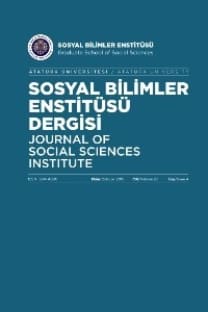Kollektivist Kültür Değerinin Sosyal Sorumlu Tüketim Üzerine Etkisini Belirlemeye Yönelik Bir Araştırma / A Study to Determine the Effect of the Value of Collectivist Culture on Socially Responsible Consumption
Sosyal Sorumlu Tüketim Anlayışı, Topluma Hizmet Uygulamaları Dersi, Kollektivizm
Conception of Socially Responsible Consumption, A Course of Community Service Applications, Collectivism,
___
Alnıaçık, U., Alnıaçık, E., Genç, N. (2011). “How Corporate Social Responsibility Information Influences Stakeholders’ Intentions”. Corporate Social Responsibility and Environmental ManagementCorp. Soc. Responsib. Environ. Mgmt,18, ss.234–245.Balıkçıoğlu, B. (2008). “Tüketici Etnosantrizminin Satinalma Davranışı Üzerindeki Etkisi: Ankara Örneği” (Yayımlanmamış Doktora Tezi). Ankara: Ankara Üniversitesi Sosyal Bilimler Enstitüsü İşletme Anabilim Dalı.
Bayraktar, M. (2001). “Sürdürülebilir Bir Toplum İçin Sorumlu Tüketim Modeli”. Standart Ekonomik ve Teknik Dergisi, Mayıs, No:481, ss.51-53.
Çiftci, S., Koçak, A. (2008). “Sosyal Sorumlu Tüketim Anlayışının Boyutları ve Ölçümüne İlişkin Ankara Üniversitesi Öğrencilerine Yönelik Bir Uygulama”. Ulusal Pazarlama Kongresi, 25-29 Ekim, Nevşehir.
Dinçer, B. (2011). “Do the Shareholders Really Care about Corporate Social Responsibility?”. International Journal of Business and Social Science,Vol:2, No:10, June.
Erdem T., Swait, J.- Valenzuela, A. (2006). “Brands as Signals: A Cross-CountryValidation Study Brands”. Journal of Marketing, Vol:70, January, ss.34–49.
Ertürk, S. (1997). Eğitimde Program Geliştirme. Ankara: Meteksan A.Ş.
Fraj, E., Martinez, E. (2006). Environmental values and lifestyles as determining factors of ecological consumer behaviour.An emprical analysis, Journal of Consumer Marketing, 23 (3), 113-144.
Hayta, A.B. (2009). “Sürdürülebilir Tüketim Davranışının Kazanılmasında Tüketici Eğitiminin Rolü”. Ahi Evran Üniversitesi Eğitim Fakültesi Dergisi, Cilt:10, Sayı:3, Aralık, ss.143-151.
Hofstede, G. (1994). “Management Scientists Are Human”. Management Science, Vol:49, No:1, January.
Hofstede, G. (2001). Cultures Consequences : Comparing Values, Behavior, Institutions and Organizations Across Nations (2 nd Eddition). Thousand Oaks; CA: Sage Publications.
Rice, G. (2006). “Pro-environmental Behavior in Egypt: Is there a Role for Islamic Environmental Ethics?”. Journal of Business Ethics, June, Volume: 65, Issue: 4, pp 373-390.
Karalar, R., Erdoğan, Z., Kiracı, H. (2008). “Çevreye İlişkin Bilgi Düzeyi ve Sürdürülebilir Tüketim Davranışı İlişkisi: Üniversite Öğencileri Üzerine Bir Uygulama”. 13. Ulusal Pazarlama Kongresi, Adana: ss. 340-358.
Kim, Y., Choi, S. M. (2005). “Antecedents of Green Purchase Behavior: An Examination Of Collectivism, Environmental Concern, and PCE”, Advances in Consumer Research, Volume: 32, 592-599.
Kocabaş, İ., Erdem, R. (2006). “Kurum yöneticilerinin kültürel eğilimlerinin yatay-dikey bireycilik ve kolektivizm boyutunda incelenmesi”. 14. Yönetim ve Organizasyon Kongresi.
Mohr, L.A., Deborah, J.W. (2005). “The Effects Corporate Social Responsibility and Price on Consumer Responses”. The Journal of Consumer Affairs, Vol:39, No:1, ss.121-147.
Mohr, L. A., Webb, D. J. and Harris, K. E. (2001). Do Consumers Expect Companies to be Socially Responsible? The Impact of Corporate Social Responsibility on Buying Behavior. The Journal of Consumer Affaires, Yıl: 35, sayı:1. Nadiri, H., Tümer, M. (2008). “Kuzey Kıbrıs Türk Cumhuriyeti’nde Üniversite Öğrencilerinin Çevreye Duyarlı Tüketici Davranışlarını Belirlemeye Yönelik Bir Saha Çalışması”. 13. Ulusal Pazarlama Kongresi, Adana: ss. 130-1
Odabaşı, Y., Barış, G. (2002). Tüketici Davranışı. İstanbul: MediaCat Yayınları.
Özalp, İ., Tunus, H.Z. Sarıkaya, M. (2008). “İİBF öğrencilerinin kurumsal sosyal sorumluluk algılamaları üzerine bir araştırma”. Anadolu Üniversitesi Sosyal Bilimler Dergisi, Cilt:8, Sayı:1, ss.69-84.
Realo, A., Allik, J., Vadi, M. (1997). “The hierarchical structure of collectivism”.Journal of Research in Personality (31), ss.93-116.
Rice, G. (2006). “Pro-environmental Behavior in Egypt: Is there a Role for”.
Şeker, H., Gençdoğan, B. (2006). Psikolojide ve Eğitimde Ölçme Aracı Geliştirme. Ankara: Nobel Yayın Dağıtım.
Şener, A., Hazer, O. (2007). “Volues and Sustainable Consuption Behavior of Women: a Turkish Sample”. Sustainable Development, DOI:10.1002/sd.329.
Topluma Hizmet Uygulamaları Dersi Yönergesi. Erişim: 21/12/2012, http://egitim.erciyes.edu.tr/formlar/thu.pdf
Yamaguchi, S. (1994). Collectivism among the Japanese: A perspective from the self. U. Kim, U., Triandis, H. C., Kağıtçıbağı, C., Choi, C., Yoon, G. Individualism and collectivism: Theory, method and applications, Newbury Park, CA: Sage, ss.175-188.
Webb, J., Deborah, M., Lois and A., Harrise, K. (2008). “A re-exemination of socially responsible consumption and its measurement”. Journal of Business Research, Volume:61, ss.91-98.
- ISSN: 1304-4990
- Yayın Aralığı: 4
- Yayıncı: Atatürk Üniversitesi Sosyal Bilimler Enstitüsü Müdürlüğü
Endülüslü şair ibn hamdîs ve şiirlerinden örnekler
Kerem KARABULUT, Ali SHANİNPOUR
Sanat Eserinin Kavranması / Understanding of a Work of Art
Konjoint analizi ile sağlık çalışanlarının konut tercihlerinin belirlenmesi
Fatih ÇEMREK, Selahattin YAVUZ
